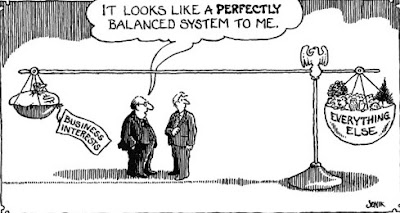Critics believe that smart city is just a buzz-phrase that has outlived its usefulness it is the wrong idea pitched in the wrong way to the wrong people. Some also believe that, In the end, they will destroy democracy. And that’s what exactly happening in Pune. Pune has participated in smart city challenge. Lack of Transparency, Confidentiality, one sided agreements, Conflict of Interests and mockery of democracy during the process of smart city challenge stage may adversely affect Pune’s future as a Smart City.
 |
| Courtsey - rhg.thehuffingtonriposte.com |
There are several irregularities in the process of selection of Consultant & in the preparation of the proposal for participation of
Pune Municipal Corporation (PMC) in the Smart Cities Challenge. Serious violations of the
Model Request for Proposal (RFP) and the irregular concessions granted to Mckinsey against public interest . An urgent investigation in the entire process of selection of Mckinsey as the Consultant to Pune Municipal Corporation and of the preparation of the proposal for assisting Pune City to participate in the Smart Cities challenge is very necessary
There is complete Lack of Transparency in entire process. The
Agreement signed between PMC & Mckinsey has been uploaded belatedly on the PMC website. PMC has resorted to a limited transparency policy by not fully uploading documents pertaining to the award of the contract to Mckinsey. Appendix B – Key experts and Appendix C – Breakdown of contract price, which are integral part of the Agreement have not been uploaded. The letters of invitation to the consultants along with the Annexure are not uploaded on the PMC website. Details of the selection process are completely absent. These documents are critical to the award of the contract on which the RFP for the Smart City is based.

There are several anomalies in the Agreement signed by the Commissioner of Pune Municipal Corporation (“PMC”) with M/s Mckinsey & Company (“Mckinsey”) and the format does not adhere to the model Request for Proposal (“RFP” for short) for the selection of consultants specified by the Government of India. Thus, the basic structure has been faulted, which will adversely affect Pune’s future as a Smart City.
Several clauses/sub clauses have been deleted, modified or supplemented against public interest. These are substantial modifications and variations. And in terms of Clause 16.2 prior written consent of the Bank is required, which the Commissioner has failed to obtain and/or display on the website. Reproduced here briefly are some of the major modifications and variations carried out against public interest.
The Commissioner has wholly deleted Clauses 17.8 (Measures to be taken), 41.2.1 (Advance Payment Bank Guarantee by Mckinsey) and 42.1 (Interest on Delayed Payments) of the Model RFP from the Agreement signed with Mckinsey (“the Agreement”). The Commissioner has also modified Clause 41.2.2, which favours the Consultant by specifying payment “at the earliest” rather than following the Model RFP of payment “within 60 days.” By deleting Clause 42.1, the Commissioner has only rationalised PMC’s inefficiency and given a leeway to the Consultant to put forth the excuse of delayed payment for any slippage in its work. These modifications clearly appear to be a quid pro quo in lieu of granting special concessions.
Clause 21.1 pertains to ‘Conflict of Interest’, which occurs in a situation that has the potential to undermine the impartiality of a person or organisation because of the possibility of a clash between the person's or the organisation’s self-interest and public interest. The three accepted categories are ‘actual conflict of interest’, ‘potential conflict of interest’ and ‘perceived conflict of interest’.
Mckinsey has replaced the Model RFP Clause 21.1 (Conflict of Interest) with an entirely different version, which has equated “conflict of interest” to “confidentiality of information”. Clause 22 (Confidentiality of information) has also been cleverly re-worded so that the onus entirely devolves on the PMC.
 |
| courtsey - jantoo.com |
Clause 21.1 (Conflict of Interest) in the Agreement is badly drafted, grammatically incorrect and convoluted. Our suspicions are further reinforced because Clause 21.1.4 (Prohibition of Conflicting Activities) does not exist in the Agreement.
For ease of understanding reproduced below are Clauses 21.1 in the model RFP and the one inserted by Mckinsey as well as Clause 21.1.4 (Prohibition of Conflicting Activities) deleted wholly from the Agreement. One can draw one’s own conclusions.
Clause 21.1 in Model RFP: “The Consultant shall hold the Client’s interests paramount, without any consideration for future work, and strictly avoid conflict with other assignments or their own corporate interests.”
Clause 21.1 in the Agreement signed by the Commissioner: “lt is Consultant's long-standing policy to serve competing clients and clients with potentially conflicting interests as well as counter-parties in merger, acquisition and alliance opportunities, and to do so without compromising Consultant's professional responsibility to maintain the confidentiality of client information consistent with such practice and consultant's confidentiality obligations to its other clients, consultant is not able to advise or consult with the Company about Consultant's serving the Company’s competitors or other parties.”
 |
| courtsey - ibfanafrica.org.sz |
Deleted Clause 21.1.4: “The Consultant shall not engage, and shall cause its Experts as well as its Sub-consultants not to engage, either directly or indirectly, in any business or professional activities that would conflict with the activities assigned to them under this Contract”.
The Agreement with the PMC has two additional clauses 22.2 and 22.3 regarding “Confidentiality” under the head “Obligations of the Consultant”. These sub clauses are contradictory because as per Sub Clause 22.2 any information that is legally required to be disclosed is not ‘confidential’ while Sub Clause 22.3 requires prior approval of the Consultant for disclosing “… any materials or information that Consultant furnishes to the Client, including the deliverables, to any third parties…”. The entire selection process of the Consultant and the process for preparation of the proposal for assisting Pune City to participate in the Smart Cities challenge are legally required to be transparent and in public domain. Further, by no stretch of imagination can obtaining “prior approval of the Consultant” be termed as “Obligations of the Consultant”. The entire process of selection and preparation of the proposal was kept under a veil of secrecy for reasons, which need not be recorded here.
By deleting Clause 25.2 (Accounting, Inspection & Auditing) PMC and Mckinsey have deprived the Bank of its right to inspect accounts and records of Mckinsey and its Sub consultants. The Bank means “International Bank for Reconstruction and Development (“IBRD-World Bank”) or the International Development Association (“IDA”). We are reproducing below the deleted Clause 25.2 of the Model RFP in full to show the length to which the Agreement has been modified in ‘accommodating” certain interests.
 |
| courtsey -www.jantoo.com |
Clause 25.2 (Accounting, Inspection & Auditing): “The Consultant shall permit and shall cause its Sub consultants to permit, the Bank and/or persons appointed by the Bank to inspect the Site and/or all accounts and records relating to the performance of the Contract and the submission of the Proposal to provide the Services, and to have such accounts and records audited by auditors appointed by the Bank if requested by the Bank. The Consultant’s attention is drawn to Clause 10 of General Conditions of Contract (GCC) which provides, inter alia, that acts intended to materially impede the exercise of the Bank’s inspection and audit rights provided for under this Clause GCC
25.2 constitute a prohibited practice subject to contract termination (as well as to a determination of ineligibility under the Bank’s prevailing sanctions procedures.)”
In spite of clear instructions to select the Consultant on Least Cost Selection (LCS) basis, the contract given by the Commissioner to Mckinsey is on the basis of Quality and Cost Based Selection (“QCBS”). This has resulted in PMC paying exorbitant cost for the Consultancy compared to other cities.Pune is the only city paying 2.5 crores to the consultant; all other cities participating in smart city mission have done this work in 40 lakh rupees only.
Related Stories
Subscribe for Free
RTI KATTA is a platform to empower oneself through
discussions amongst each other to solve their problems by using Right to
Information act, Every Sunday at Chittaranjan Watika, Model Colony,Shivaji
nagar, Pune, between 9.30 to 10.30 A.M.
RTI Resource Person, RTI Columnist
Phone – 9923299199













